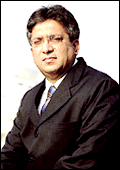 |
 |
|
NAME: Rushabh Sheth (left) and Nikhil
Desai AGE: 34 & 35, respectively
FIRM: Karma Capital Advisors Pvt Ltd
FUND CORPUS: Portfolio Management Services: Rs 25
crore; Offshore fund: $14 million
|
Meet
Rushabh Sheth, 34, and Nikhil Desai, 35. Sheth's a former fund
manager with Kotak Asset Management Company, whilst Desai was
a portfolio manager with ABN Amro Bank. Until he teamed up with
Sheth to start up Karma Capital Advisors which, other than managing
high net worth clients, also advises offshore funds. "The
reason for setting up Karma Capital is more of a philosophical
one," muses Sheth. "The way money is managed these days
is driven more by institutional imperatives, which are shorter-term
in nature. Rather than running after assets to manage, we wanted
to manage money based on our philosophy." That philosophy
is pretty straightforward: Manage money and build wealth for clients
over a long period of time. Whilst Sheth currently advises a $14-million
(Rs 63-crore) offshore fund, the Juilis Baer Multiopportunities-India
Millennium Fund, Desai takes care of the portfolios of some 30
high net worth clients. Karma Capital has a portfolio management
scheme with a corpus of Rs 25 crore. Ticket size: Rs 1 crore.
Fee structure? A mix of fixed and performance-driven.
Sheth and Desai aren't the only ones to chuck
up conventional jobs in financial services to take on risk -and,
of course, the prospect of fabulous returns-head-on. As the Indian
stock markets continue to defy gravity and keep hitting new highs
every other day, in the process delivering some of the best returns
in the universe of equity-investing, a clutch of brash, young
and adventurous self-starters are aiming to make hay by the truckload
as the sun keeps shining benevolently on Dalal Street. This breed
of managers tends to be in its late 20s or early 30s, as opposed
to the 30-ish and early-40s profile of yesterday's dyed-in-the-wool
fund manager. And many of them are expats who've realised that
if the path to Indian markets is not paved with riches, a goldmine
for sure exists at the destination. Most of these managers are
overseeing offshore India-dedicated funds, 13 of which were launched
since January 2005. As K. Sudarshan, Managing Partner, EMA Partners
International, a hr and placement consultant, says: "The
fund managers who have set up their advisory shops in India are
seeking to maximise their returns and create their own track records.
With the market rapidly expanding in the past 12 months and new
asset management companies (AMCs) and hedge funds entering India,
there is a huge dearth of talent in the area of fund management."
 |
 |
|
NAME: Rakshit Sethi
AGE: 27
FIRM: Fair Value India
FUND CORPUS: Offshore fund: $20 million
|
NAME: Nitin Raheja
AGE: 38
FIRM: Dawnay Day A.V. Financial Services
FUND CORPUS: PMS: Rs 11 Crore |
Clearly, India is the place to be for these
new fund managers-and the place to earn their stripes. The ever-increasing
tribe of millionaires in the country wants qualified people to
handle its money. And there aren't enough of them going around.
Sudarshan of EMA observes that if equity analysts and fund mangers
are setting up advisory firms in India, "it's no more to
make a living, but it's got more to do with making a name".
Compensation is higher in advisory, as it is in terms of a percentage
share of profits. Adds Desai of Karma Capital: "We have a
minimum two-four year perspective when managing clients' money.
The real challenge is to drive absolute return across market cycle.
The whole idea is when the market goes down, we still continue
to deliver positive returns."
What's common to this new breed is the conviction
in the long-term India story, revolving around three themes: domestic
consumption, infrastructure build-up and growth from outsourcing.
"You could make money in the Indian market by riding any
one of these broad trends," says Nitin Raheja, senior Vice
President & Chief Investment Officer, Dawnay Day A.V. Financial
Services. A former fund manager with Sun F&C Mutual Fund,
Raheja is now in charge of a portfolio management scheme and is
also expected to advise the $75-100 million (Rs 337.5-450 crore)
offshore India-dedicated Fulcrum DDAV India Opportunity Fund.
Along with this new crop of money managers
comes plenty of new thinking. And innovation too. Consider for
instance the multi-manager concept, not unpopular in the West
but still alien to India. Until ING recently set up Optimix, a
fund that does not rely on the strategy of just one investment
manager but on many. As Mugunthan Siva, Chief Investment Officer,
Optimix, explains: "India is the second country in the Asia
Pacific and third worldwide after Australia where the multi-manager
concept is being used by ING. There is great potential in India
for such open-architecture, third party fund of funds because
there is a huge bandwidth between returns generated by fund managers."
Meantime, many of the old-timers-at least,
relatively-are also making the move towards advisory services
from investment management. "Managing a large-cap fund can
become monotonous. The conviction to do better work and find multi-baggers
has been the primary reason for moving from mutual fund to advisory,"
says U.R. Bhat, a veteran fund manager, now Managing Director,
Dalton Capital advisors. Similarly, Vibhav Kapoor, Group Investment
Strategist, IL&Fs, is also managing a $16 milion (Rs 72 crore)
India-dedicated fund. And Bharat Shah, Managing Partner &
Chief Executive officer, ask Raymond James, is advising the Switzerland-based
hedge fund Naissance Capital on its Naissance Jaipur Fund.
As the market reaches fair values, the challenge
clearly is to fund new ideas. In the short term, patience and
caution are the catchwords. As Rakshit Sethi, who runs the offshore
Fair Value Risk Arbitrage & Value Fund, points out: "It's
not a sin, or at least a much smaller one, to sometimes sit on
the fence and wait, rather than go in, when things don't make
sense to you and you get out first ball. One needs to sit with
a loaded gun and wait for the white elephant patiently. He always
comes."
|







